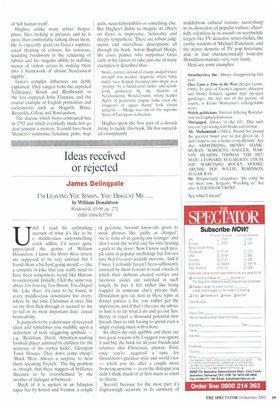Ideas received or rejected
James Delingpole
I'm LEAVING YOU SIMON, You DISGUST ME . . by William Donaldson Weidenfeld, £9.99, pp. 272, ISBN 03043657501 until I read his enthralling account of what it's like to be a middle-class sixtysomething crack addict, I'd never quite appreciated the genius of William Donaldson. I know his Henry Root letters are supposed to be very satirical but I found them a bit hard going myself — like a complex in-joke that you really need to have been somewhere weird like Harrow to understand. Initially, I felt the same way about I'm Leaving You Simon, You Disgust Me. Like Root, it's sure to be found in every middle-class downstairs loo everywhere by the time Christmas is over, but on my first flick-through it seemed to me to fail in its most important duty: casual browsability.
It purports to be a dictionary of received ideas and sometimes you stumble upon a definition of truly staggering aptitude — e.g. 'Beckham, David. Attention-seeking football player admired by children for the accuracy of his corner kicks"; 'Georgian Town Houses. They don't come cheap'; 'Black Men. Always a surprise to hear them speaking French.' The big problem is, though, that these nuggets of brilliance threaten to be overwhelmed by the swathes of dialogue in between.
Much of it is spoken in an Islington tapas bar by Simon and Vernon, a couple of pedantic, boorish know-alls given to stock phrases like 'guilty as charged', 'we're none of us getting any younger' and 'don't want the world and his wife beating a path to the door.' Now I know such people exist in popular mythology but I'm not sure that I've ever actually met one. And if I have, I certainly haven't been sufficiently annoyed by them to want to read a book in which their dubious eternal verities and facetious asides are satirised at such length. In fact it felt rather like being trapped in someone else's private hell. Donaldson gets sat next to these types at dinner parties a lot, you rather get the impression, and if that's the case my advice to him is to do what I do and go out less. Better to reject a thousand potential new friends than to risk having to spend even a single evening stuck with a bore.
So, that's my only quibble and there are two good reasons why I suggest you ignore it and buy the book for all your friends and relatives this Christmas, anyway. First, once you've acquired a taste for Donaldson's peculiar style and world view — which you do, after a couple more browsing sessions — even the dialogue you didn't think much of at first starts to exert its charm.
Second, because for the most part it's frighteningly accurate in its summary of


































































































 Previous page
Previous page